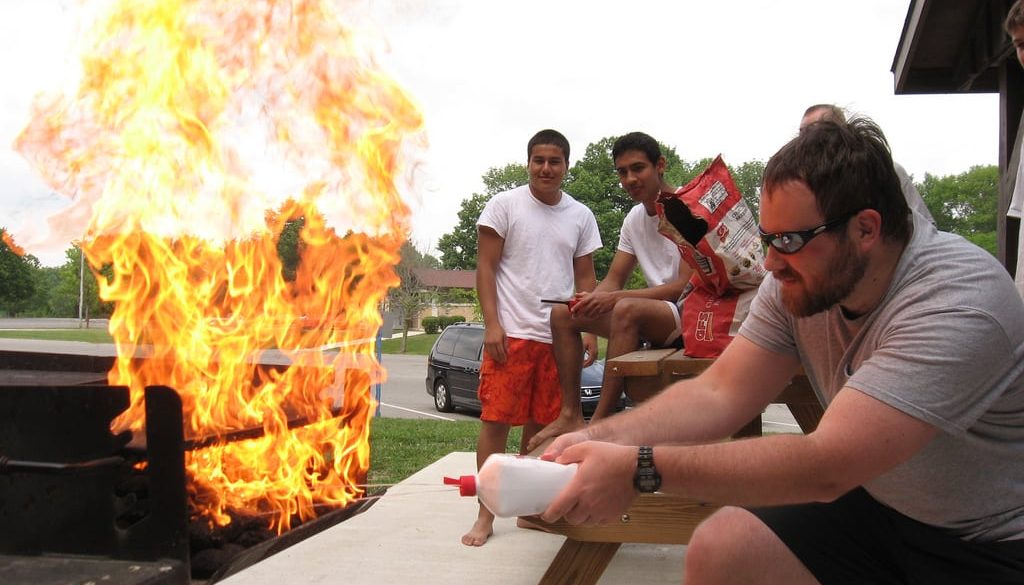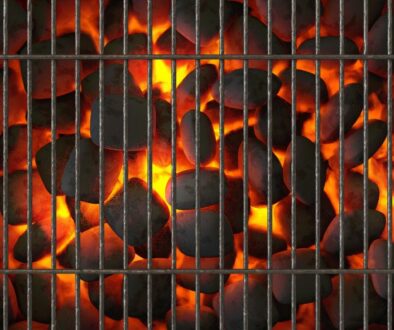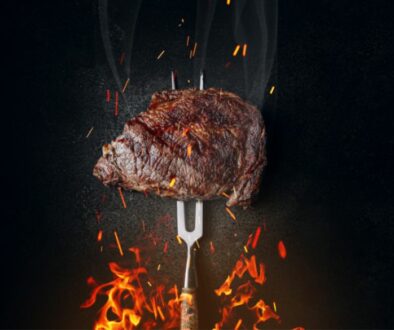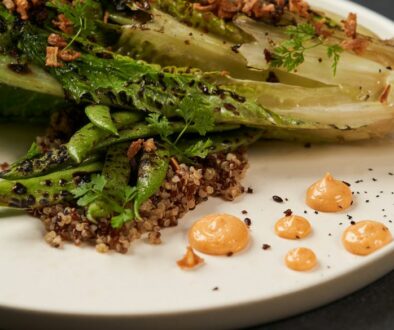10 Biggest Grilling Mistakes and How to Avoid Them
While learning how to grill may seem overwhelming at first (especially if you’re just starting out), we promise it gets easier once you learn what not to do! Here are ten common grilling mistakes and how to avoid them.
If you’ve ever been to a barbecue, you know that it’s the ultimate test of a cook’s skill. Grilling is an art form, one that takes time and practice to master. While there are many resources out there on how to grill the perfect steak or chicken breast, many people don’t realize they’re making mistakes on their first few tries. The problem with these mistakes is that they can ruin your meal and make you feel like giving up on grilling altogether.
Not cleaning the grill frequently enough or removing food residue properly.
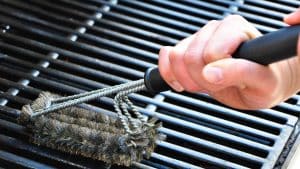
One of the biggest mistakes people make when grilling is not cleaning their grill frequently enough. Food residue can cause flare-ups, which can lead to food catching on fire, so it’s important that you clean your grill after each use. Also, if you don’t clean your grill properly before using it again, you’ll be at risk for food poisoning.
To properly clean your grill:
Use a grill brush to remove food residue from the grates and other parts of your grill after each use (you should do this even if you’ve been cooking with coals).
If there are large pieces of meat or fish stuck to the grates or bottom of your grill (maybe they fell off while they were cooking), use a scraper to remove them completely before putting them in the trash or dishwasher.
Choosing the wrong kind of charcoal or firewood.
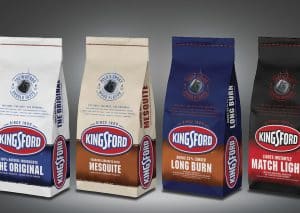
The first mistake many people make is choosing the wrong kind of charcoal or firewood. This is a problem because it can lead to a lot of frustration during your grilling experience, which should be fun! Something you should keep in mind when choosing your charcoal is that there are different kinds of charcoal for grilling, there are some that burn very intensely but go out quickly too, and there are others that do not burn at very high temperatures but last much longer. So to prevent your favorite cut of meat from burning or not being well cooked, you should know which is the best grilling charcoal.
To avoid this mistake, you should make sure that your charcoal is dry before you use it. You should also pay attention to the size and moisture content of your wood before using it as fuel for grilling. Here are some things to look out for: wood that has not been cured properly, wood that has been cut too large or small for its container (or vice versa), wood that hasn’t been seasoned long enough, wet or damp pieces (even if they’re green), hardwood lump charcoals like mesquite chips instead of briquettes because they burn hotter than coal but produce less smoke and ash compared to logs like hickory or oak).
Not preheating the grill.
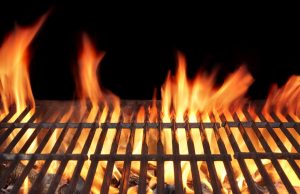
This is one of the biggest grilling mistakes I see people make. It’s easy to get in a rush and just hop on the grill, but it’s crucial to preheat the grill first. Preheating allows your food to cook more evenly, which means you won’t have any cold spots or overcooked areas of meat.
No matter what type of grill you’re using—gas, charcoal or electric—you should always preheat it for at least 10 minutes before grilling anything. If you’re using a gas grill, turn all burners on at high heat for 15 minutes before placing food directly over them; keep in mind that this will increase cooking time by about 15%. For charcoal grills and electric grills, warm up your coals by spreading them into an even layer in a loose pile; then spread them out gradually (but don’t pack them down). For electric grills with removable flat plates that can be set aside while heating up (like those made by Weber or Traeger), place them on the highest setting while warming until they reach 400°F (204°C).
Using too much salt or marinade.
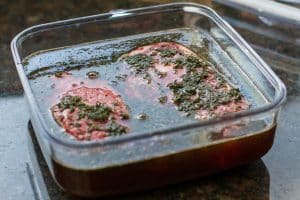
The next time you’re grilling, think twice before dumping salt or marinade on your meat. Salt can make it taste bland, while marinades can sometimes make the meat too strong. Use both sparingly to enhance the flavor of the meat, not to hide it. Be careful not to use too much of either—you’ll know when you’ve used enough if your food tastes like what it should: delicious!
Leaving the grill uncovered while cooking.
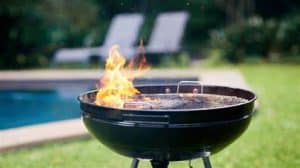
Leaving the grill uncovered while cooking is a common mistake. It may seem like an old wives’ tale for many people, but it’s actually one of the biggest mistakes you can make in terms of food safety and health. Here are some reasons why:
Open grill lid can increase risk of food drying out. The open grill lid allows heat to escape, which means your food won’t cook as quickly or thoroughly as it normally would—and that can lead to dry, burnt edges on whatever you’re grilling.
Open grill lid increases risk of fire. Leaving your grill uncovered while cooking increases the risk that something will catch fire or flare up due to grease drippings or other flammable materials (like charcoal). An open grill also allows any wind around it to blow ash into the flames and cause sparks that might ignite nearby objects (like grass).
Open grill lid increases risk of falling into fire. If someone accidentally walks in front of an open gas-powered smoker with their back turned towards its opening… well… let’s just say there aren’t too many things more painful than getting burned by a lit flame at close range!
Not using tongs to handle food.
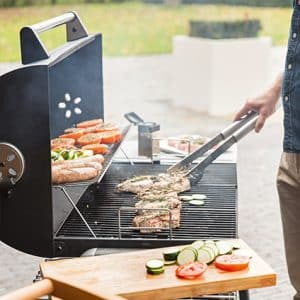
Do not use tongs to turn food. Tongs are meant for moving food around the grill, and they can easily transfer raw juices onto cooked areas of your meal.
Do not use tongs to move food onto or off of a plate. Use a spatula instead, which will keep any juices contained within it until you’re ready to serve up the dish.
Do not use tongs to move food from one vessel into another (say, from an aluminum foil packet into an oven-safe serving dish). This could lead to cross-contamination between raw foods and cooked ones—and nobody wants that!
Using lighter fluid that’s old or stored improperly.
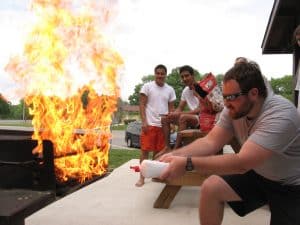
Lighter fluid is flammable, meaning that it can be dangerous to store in a crowded space.
If you have kids, pets or elderly people in your home and risk of fire is high, keep lighter fluid away from those areas. Store your lighter fluid in a cool, dry place with low humidity; this will extend its shelf life by several months. Using old, expired lighter fluid might damage your grill’s propane tank or ruin it completely if the liquid starts to leak into the tank while cooking on an open flame during grilling season.
Turning food too often.
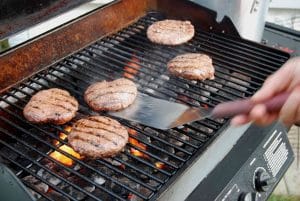
Turning food too often will not only ruin the appearance of your meal, it can also dry out your food. To avoid over-cooking your meat, turn it once and let it cook for about four minutes on each side. After that time has passed, check to see if the meat is cooked all the way through. If the juices run clear, then you’re good to go!
If you are really concerned about whether or not your grilled foods are fully cooked through (and we recommend that you should be), use a thermometer to test them before removing them from the grill.
Cooking at the wrong temperature.
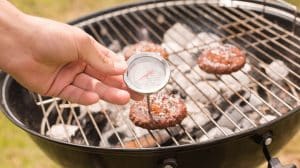
Cooking at the wrong temperature can be a major bummer. You’re going to want to avoid this as much as possible, as it’s not only bad for your food but it can also be dangerous.
So what is the right temperature? Well, that depends on what you’re cooking. But generally speaking, grilling meat is done at about 325°F-450°F (160°C-230°C). If you think about how long ago grilling started and when our ancestors used wood fires or coal to cook their food over open flames—that’s right around where most people cook their meat today! So if we’ve been doing it this way for thousands of years…why change now?
But there are times when raising or lowering your grill isn’t ideal either so here are some tips:
Overcrowding the grill.
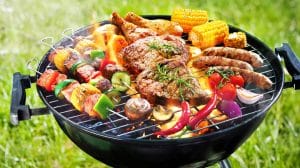
Don’t overcrowd your grill. If you put too much food on the grill at once, it’s just going to burn and overcook. It’s tempting to pile on as much meat or veggies as possible when you’re grilling for a crowd, but resist the urge! Instead, use tongs to move things around so that each piece has room for proper browning.
Use your fingers instead of tongs. Yes, it may seem counterintuitive at first—but this is actually one of the most basic rules of grilling: use tongs only for stability (not strength). That means using them in situations where they’ll be steady while you flip something on its side or rotate it; otherwise, use your hands! This way, if you do accidentally drop something onto the coals (which happens often), then at least there won’t be any serious damage done by sharp metal points digging into your skin. And if worse comes to worst and there is some damage done—well…that’s what Band-Aids are for!
Take these steps and you’ll become a master griller quickly!
If you want to become a master griller, take these steps.
Have a plan before starting. There are so many things that can go wrong when you’re grilling, but having a plan ahead of time will help avoid those mistakes. Think about how long each step will take and what supplies you’ll need—and don’t forget to start with the basics: food safety!
Don’t be afraid to try new things. When I first started grilling, my husband gave me helpful tips and tricks on where he found success in his own cooking adventures. Ask for help from friends and family who have experience with grilling—or even just ask around online! The best way to learn is by getting feedback from others who have tried it before us; we all benefit from shared knowledge!
Don’t be afraid of failure (but keep your safety gear handy). While there may be some trial-and-error involved at first when learning how to grill like an expert (or even just feeling confident enough), I promise it’s worth it once you get used to making delicious meals outside while avoiding common mistakes like overcooking meat or burning yourself on hot coal embers spilling out onto your patio decking surface area during cleanup time after dinner has been served up successfully.”
We hope this guide has helped you avoid some of the most common grilling mistakes and become a master griller. After all, nobody likes overcooked burgers or undercooked chicken! Now get out there and start making some deli

